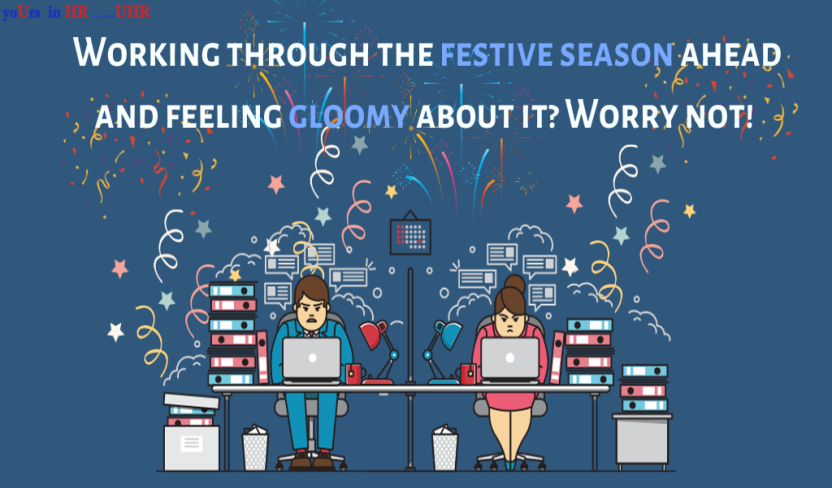
As we talked about in our earlier article, this is a good time to bask in the festive spirit. Major festivals are taking place around the world as we write this and within the next two months. This part of the year is high on energy- spiritual as well as celebratory. As the Diwali celebrations conclude, we have Thanksgiving and Christmas in the air.
As many of us look forward to holidays, celebrations and office parties, there are some of us who may have to work through it all. Reasons could be multiple.
- Maybe your job is such that the festive season demands extra work from you.
- Maybe your company is going through a period when taking off days or celebrations aren’t very profitable and sensible activities.
- Maybe you were not able to travel back to your family for some reason.
And so on.
It is difficult to ignore all the celebrations around and find your focus. It is also difficult for many of us, who do love the festivities to not feel what is popularly known as ‘FOMO’, the ‘fear of missing out’. What are some strategies to use if you are someone who is going to be working through the festive season?
Find ‘other’ ways to break the monotony:
While it might not be possible for you to get a leave, it might still be possible to break the monotony by changing your perspective. After all, breaks, holidays or celebrations of any kind, festivities included, are ways to break the monotony of the mundane life. They are rituals to signify a change in rhythm of life. Festivals are shifts in life’s gears offered by traditions.
This change in rhythm of life can be created by oneself as well. If one cannot change the gear via the method given by age old traditions, we can create our own ways of changing gears. This could be creating simple practices and rituals. Simple, doable practices. For example, if it is not possible to dress nicely at your office, you can still make a tiny, micro change in your bearing and routine to feel the change, like wearing a different watch. Or changing the wallpaper of your desktop or cell-phone. Or taking something different for lunch. Or preparing your tea differently than usual.
Simple change in your own modern ‘rituals’ can still work as a break in the monotony.
Noticing your commute with slightly empty roads, the unusualness in your regular inbox, the way your office building feels different and being mindful about countless other small changes can still be ways to find the magic in the mundane, to break the monotony.
Be happy for others:
Being happy for others is an underrated superpower.
Often times, the ‘FOMO’ mentioned earlier comes from the simple fact that we are envious of the ones who are getting to take a break. We want what they have. We feel that lack, that injustice, the unfairness. We feel tired and exhausted by looking at the photos of others posted on social media.
Many people will tell us to block out these ‘distractions’, to remain so focused on our work, manage the tasks such that we don’t feel like there are festivities going on out there. That is definitely one way.
But what if we flipped the script there and tried to enjoy through others, vicariously?
Looking at the photos of festivities around, and feeling a sense of gratitude that one lives in a place where there is so much hubbub around, or have that kind of access, might actually improve our mood instead of having the attitude of missing out. Listening to the stories about vacations and office celebrations with a sense of curiosity and love, instead of a sense of lack and unfairness might give us the warmth we didn’t experience directly.
Warmth doesn’t need festivities:
As the Diwali sweets are stored away, Christmas decorations brought out, and the gloom of working through the festivals still around, it would be a good reminder that one can find the spirit all year round. Meeting loved ones, and keeping the love and laughter alive could be a year-round thing! A gentle reminder to self that festivals are one of the ways to take in the warmth of human connections, and not the only way could go a long way in changing that script of FOMO to that of the joy of simply being.
Focusing on our work or denying the unpleasantness might be counterproductive. Instead accepting that we are missing out, but still being curious to know how others are celebrating might be a bigger step towards feeling slightly less unpleasant.
While it is true that missing out on the festive season, for whichever season might lead to a gloomy mood and a sense of unfairness, it is also true that magic can also be found in the mundane!



